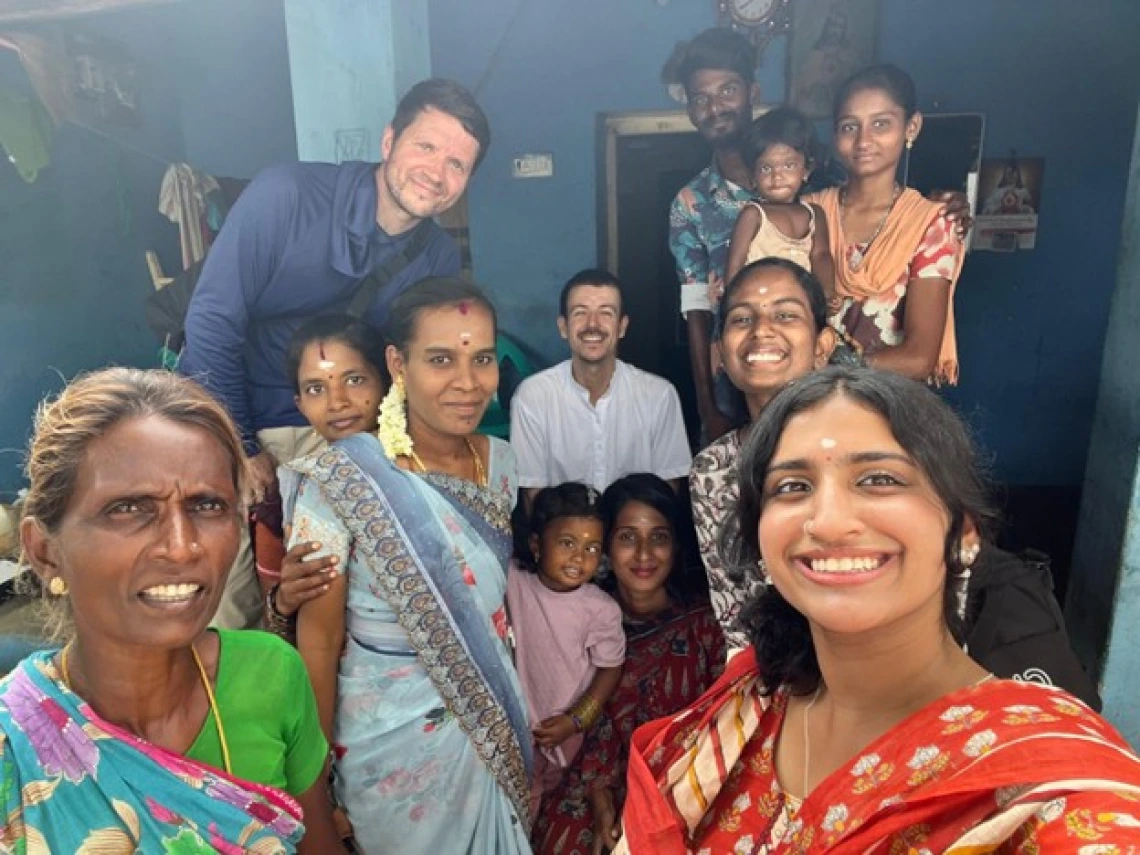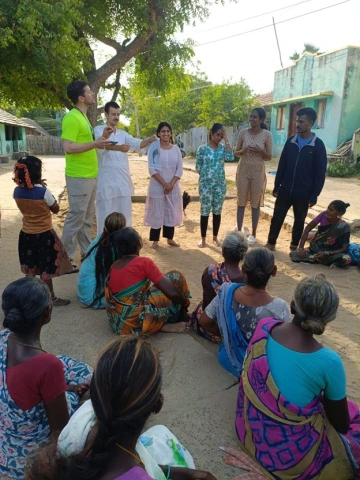RISE Internship Lessons in India: Building Life and Career Skills Experientially

Aaron Womack (last row, left) and Anusha Sharma (first row, right) with their host family in the village of Soliyakuddi in southern India.
This blogpost by Aaron Womack reflects upon his recent internship at Amrita University; you can read more about other Human Rights Practice students who recently completed this internship funded by the RISE Program of the Arizona Institute of Resilience.
Participating in the RISE internship, facilitated by the U of A Human Rights Practice program and Amrita University’s Live In Labs, was both a building block in my professional development and personal highlight of my life. To be selected and travel to southern India this summer was thrilling.
Accepting the challenge alongside fellow Arizona interns made the journey especially memorable. Our opportunity focused within Amrita’s seaweed cultivation and climate solutions initiative, “Blue is the New Pink.” This effort assists women of coastal villages with the development of seaweed harvesting skills and provides the necessary equipment to begin cultivation and enter the local market. In addition, sustainability education encourages positive environmental habits.
I was welcomed onto campus for partnered study with Amrita’s School for Sustainable Development practitioners before embarking on a 10-day field visit. Our team of 5 traveled from Kerela via the Guruvayur-Madurai Express train across southern India to reach the town of Thondi. From there we set out each day into the village of Soliyakuddi.
Building Practical Skills
The experiential learning made available by this community’s invitation produced leaps in the understanding of myself and a world different than mine, rich in strength and creativity. Through this cross-cultural interaction I expanded my perspective on women’s empowerment, education models, communication across languages, and humility. My continued studies in Human Rights Practice will no doubt be informed by the time spent with these amazing people.
Sustainability activities are a mainstay of Amrita’s fieldwork. In Soliyakuddi, we focused on led discussions that encouraged acceptance of responsibility for our ocean interactions and species dependent on it. Since the women of this village on the sea of course hold vast environmental awareness already, our goal was to enhance existing knowledge specifically about the harvesting of sea plants. The importance of monitoring harvest yields, rhythm of seasonal harvests, and study of seaweed dependent fish and animals were advocated.
Language was an initial barrier. Interpreters played a crucial role but additional strategies helped too. Over the week of presentations, we learned to trim extraneous fluff to streamline messaging, become more aware of non-verbal communication enhancement, and remain attuned to reception and reciprocal communication from the women. Developing these skills in realistic settings was invaluable.

Aaron working with a translator to present the salmon story.
Creating education materials specific to our audience was a necessity. Age, technical experience, and socioeconomic factors needed to be respected. Traps of Western perspectives popped up throughout but were acknowledged and dropped as best as possible. That said, I relied on my lived experience in the Pacific Northwest in writing my primary contribution, an interactive story telling exercise. I used the salmon depopulation happening in my home region to discuss different motivations for fishing, techniques, and awareness of impacts. The attempt was to use another area's challenges to shift focus from instruction on the women’s own practices and approach broader ideas of sustainability and overharvesting.
The successes and failures experienced through the implementation were equally valuable. There were both bumps and big moments of felt triumph. When we returned from the field, I worked with Amrita specialists to weave in data collection on participants’ marine awareness into the learning module I had created. The functionality of qualitative and quantitative data within academic study was explored. We also reframed the activity in a Transformative Learning/Women’s Empowerment synergistic lens and wrote in access points to collect the women’s recommendations on sustainable practices. These testimonials and tips can be shared with like communities and abroad going forward.
Access to joy
The attempt to articulate our gratitude for the women of Soliyakuddi will fail, but I’ll try. They were extremely gracious and treated us with hospitality, love, and kindness. The moments I spent with them, their children, and families will stay with me forever. I learned so much developing and facilitating the materials, but that was far eclipsed by the life skills I learned in these moments with their families.
There are not many obstacles set between the women and levity. Their direct relationship with community and loved ones correlated to more direct relationships with joy and calm. In two specific cases, swimming and a game with village kids, the women were present and quickly willing to allow amusement and easy playfulness within themselves. This was infectious and uplifting. There was no multi-tasking. No interruptions. Only the shared joy of the moment and the sounds of that expressed by all.
I brought home an immense appreciation for my own life. Yes, appreciation for the materialistic things I am lucky to have access to that they do not, but more so the things we all have whose ultimate value was demonstrated.
I return to the concept of accessing joy. In my daily life I am surrounded by purchased things and services meant to entertain me and provide comfort. This abundance of amenities rarely succeeds in making me smile the way these women smiled when their children were the center of attention. I don’t laugh as genuinely once a day as they laugh freely and fully multiple times in a visit with loved ones.
Their life is harder than mine in many ways but my path to natural joy can be far more impeded than theirs. They are living directly in tune with themselves, their families, and their tasks for survival. The opportunity to witness their pace, focus, love, and emotional intelligence was an education I will forever be grateful for. Sincere appreciation is extended to the staff of both universities for making this internship possible.
Aaron Womack is an undergraduate at the University of Arizona, majoring in Human Rights Practice.
Related stories:
Building Coastal Resilience and Women's Empowerment: My Internship at Amrita University by Anusha Sharma
Threads of Resilience: Lessons from Women Entrepreneurs in India by Beatriz Winters

